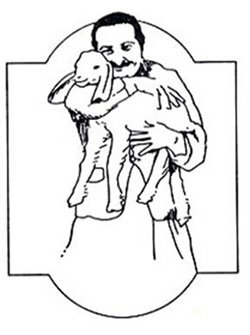Because Lyn's book is absolutely centered on this quest, everything in it, both words and brushstrokes, are saying the same thing. To hear someone speak of their love for Baba is to aurally experience a painting of Baba's face which inspires that love. While gazing on such a painting is to visually apprehend the heartfelt declaration, "Baba, I love you." Every word and brushstroke in the book is doing the same thing — searching for the face of God.
The purpose of art is to give our love and sacrifice for the Beloved expression. But if this is art's purpose, it is the nature of true art to inspire us to serve, and to enable us to feel love. Because Lyn is searching for the face of God, his book is the fountainhead of a new art. And because Lyn is an artist, his book moves us to begin or continue with renewed dedication our own search for the Beloved's eternal face. May we all please the Beloved by one day truly seeing Him as He really is.
| MERWAN – Stories of Meher Baba for Children by Ann Giles. Illustrations by Dot Lesnik. Soft cover, 82 pages. Sheriar Press, $4.95 |  |
This is a delightful book of Baba stories for “the younger set." Here is one:- |
|
|
At first, after Meher Baba left his body, the mandali had no time to themselves. They were kept very busy doing the work that Baba had had given them. Later, at Meherazad, they were not so busy and found themselves missing Baba very much. |
One evening at dusk Mani found Eruch washing his face at the tap outside his cabin. She spoke to Eruch, but he didn't answer. He just wiped his face with his towel.
She waited patiently. But instead of answering, Eruch beckoned to Mani and started walking past the mango tree toward the edge of the field.
Mani was puzzled. All Eruch had said was, "Come," so she went.
By now it was so dark that she could hardly see. Silently she stood beside Eruch at the edge of the field. Finally Eruch spoke. "Can you hear?" he asked her.
Mani strained her ears. Sure enough, from the other side of the field, she could hear a soft sound: "Baa-baa, baa-baa, baa-baa."
It was the sound of sheep in the field, and they seemed to be calling out Baba's name. Hearing them made Mani feel very happy. "Ah, yes," she said. "I hear."